
The Albert, formerly the Griswold Building, is a former office building named after architect Albert Kahn, located at 1214 Griswold Street in Downtown Detroit, Michigan. It was listed on the National Register of Historic Places in 1980 and is part of the Capitol Park Historic District. In 2014, it was renovated into apartments.

The Albert Kahn House is in Midtown Detroit, Michigan, within the Brush Park district. It is currently the headquarters of the Detroit Urban League. The house was designated a Michigan State Historic Site in 1971 and listed on the National Register of Historic Places in 1972.

The Cass–Davenport Historic District is a historic district containing four apartment buildings in Detroit, Michigan, roughly bounded by Cass Avenue, Davenport Street, and Martin Luther King, Jr. Boulevard. The district was listed on the National Register of Historic Places in 1997. The Milner Arms Apartments abuts, but is not within, the district.

The Cass Park Historic District is a historic district in Midtown Detroit, Michigan, consisting of 25 buildings along the streets of Temple, Ledyard, and 2nd, surrounding Cass Park. It was listed on the National Register of Historic Places in 2005 and designated a city of Detroit historic district in 2016.

The Eddystone Building is a former hotel located in Midtown Detroit, Michigan, at 100-118 Sproat Street. It was listed on the National Register of Historic Places in 2006.
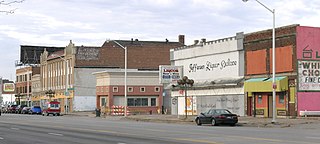
The Jefferson–Chalmers Historic Business District is a neighborhood located on East Jefferson Avenue between Eastlawn Street and Alter Road in Detroit, Michigan. The district is the only continuously intact commercial district remaining along East Jefferson Avenue, and was listed on the National Register of Historic Places in 2004.

The River Terrace Apartments is an apartment building located at 7700 East Jefferson Avenue in Detroit, Michigan. It was listed on the National Register of Historic Places in 2009. River Terrace Apartments was one of the first two garden apartment complexes built in Michigan which used loan guarantees from the Federal Housing Administration, the other being Hillcrest Village in East Lansing.

The Detroit Financial District is a United States historic district in downtown Detroit, Michigan. The district was listed on the U.S. National Register of Historic Places on December 14, 2009, and was announced as the featured listing in the National Park Service's weekly list of December 24, 2009.
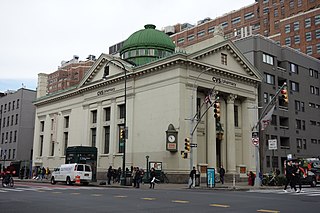
The New York Savings Bank Building is a former bank building in the Chelsea neighborhood of Manhattan in New York City. Constructed for the defunct New York Savings Bank from 1896 to 1898, it occupies an L-shaped site on 81 Eighth Avenue, at the northwestern corner with 14th Street. The New York Savings Bank Building was designed by Robert Henderson Robertson, with later additions by George H. Provot and Halsey, McCormack & Helmer. The building's facade and interior are New York City designated landmarks, and the building is listed on the National Register of Historic Places.

The Union Arcade is an apartment building located in downtown Davenport, Iowa, United States. The building was individually listed on the National Register of Historic Places in 1983 by its original name Union Savings Bank and Trust. Originally, the building was built to house a bank and other professional offices. Although it was not the city's largest bank, and it was not in existence all that long, the building is still associated with Davenport's financial prosperity between 1900 and 1930. From 2014 to 2015 the building was renovated into apartments and it is now known as Union Arcade Apartments. In 2020 it was included as a contributing property in the Davenport Downtown Commercial Historic District.
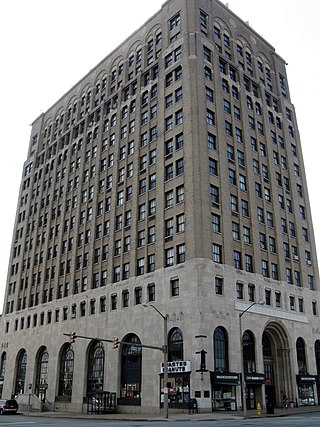
Renaissance Centre, formerly known as the Erie Trust Company Building and the G. Daniel Baldwin Building, is a 198-foot (60 m) skyscraper located in Erie, Pennsylvania in the United States. Intended to be the headquarters for the largest bank in Erie, the Erie Trust Company Building was designed by the firm Dennison and Hiron in 1925. Completed in 1928 at the climax of the Roaring Twenties, the building's namesake bank failed in 1933 after the start of the Great Depression. It was renamed the G. Daniel Baldwin Building in 1943. In 1996, it became Renaissance Centre and was listed on National Register of Historic Places in 2000.

The Lincoln Branch Library is a former Carnegie library building in the Lincoln Park neighborhood of Duluth, Minnesota, United States. It was constructed from 1915 to 1917 as the first permanent home of a Duluth Public Library branch first established in 1892. The Lincoln Branch Library was built of brick and limestone in the Late Gothic Revival style. It was the last of the three Carnegie libraries built in Duluth.

The New Center Commercial Historic District is a commercial historic district located on Woodward Avenue between Baltimore Street and Grand Boulevard in Detroit, Michigan. It was listed on the National Register of Historic Places in 2016.

The Detroit News Complex consists of two buildings: a historic office building at 615 West Lafayette Boulevard in Detroit, Michigan, and an associated parking structure, located across the street at 901 West Lafayette. The two buildings were listed on the National Register of Historic Places in 2015. The main building held the offices of The Detroit News until 2013, and was also the site of the first commercial radio broadcast in the United States.

The Dearborn City Hall Complex is a complex of three government buildings located at 13615 Michigan Avenue in Dearborn, Michigan. The complex includes the 1921 Dearborn City Hall, the 1929 Police and Municipal Courts Building, and an office/auditorium concourse addition constructed in 1981. The complex was listed on the National Register of Historic Places in 2014.

The University of Michigan Central Campus Historic District is a historic district consisting of a group of major buildings on the campus of the University of Michigan in Ann Arbor, Michigan. It was listed on the National Register of Historic Places in 1978.
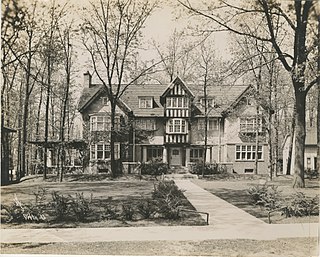
The Delta Upsilon Fraternity House is a fraternity house located at 1331 Hill Street in Ann Arbor, Michigan. It was listed on the National Register of Historic Places in 1995.
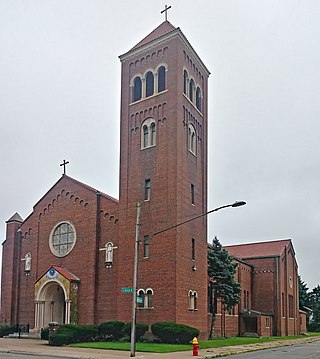
The Church of the Transfiguration Historic District is a group of buildings associated with what was the Church of the Transfiguration Roman Catholic parish, located at 5830 Simon K in Detroit, Michigan. It was listed on the National Register of Historic Places in 2019.

The Greenwich Savings Bank Building, also known as the Haier Building and 1356 Broadway, is an office building at 1352–1362 Broadway in the Midtown Manhattan neighborhood of New York City. Constructed as the headquarters of the Greenwich Savings Bank from 1922 to 1924, it occupies a trapezoidal parcel bounded by 36th Street to the south, Sixth Avenue to the east, and Broadway to the west. The Greenwich Savings Bank Building was designed in the Classical Revival style by York and Sawyer.

The Bowery Savings Bank Building, also known as 130 Bowery, is an event venue and former bank building in the Little Italy and Chinatown neighborhoods of Lower Manhattan in New York City. Constructed for the defunct Bowery Savings Bank from 1893 to 1895, it occupies an L-shaped site bounded by Bowery to the east, Grand Street to the south, and Elizabeth Street to the west. The Bowery Savings Bank Building was designed by Stanford White of McKim, Mead & White. Since 2002, it has hosted an event venue called Capitale. The building's facade and interior are New York City designated landmarks, and the building is listed on the National Register of Historic Places.






















